Conference paper accepted
26/07/22/09:27 Filed in: Conference paper
F. Pérez-Gámez, P. Cordero, M. Enciso, A. Mora, M. Ojeda-Aciego. Grading unknown information via an intuitionistic approah. European Symposium on Computational Intelligence and Mathematics (ESCIM), Naples, Italy, 2022.
ABSTRACT Information is not always precise and exact and, in many cases, some data are missed or unknown. To manage this data, fuzzy logic introduces a set of (infinitely many) values between the two Boolean truth values. Other authors use a three-valued approach, by adding an intermediate value to the set of Boolean truth-values. We propose a formal framework strongly based on Atanassov fuzzy sets, associating each proposition with a pair of degrees characterizing our knowledge about the two truth-values, since this logic does not include the law of the excluded middle.
Our starting point is the crisp Formal Concept Analysis, which provides a formal framework for knowledge representation and reasoning. Information is described by means of a binary relation characterizing the relationship among a set of objects and a set of attributes. We extend the crisp framework considering a pair of degrees for each element in the relation.
Formal concept analysis provides a twofold representation of knowledge: the so-called concept lattice and the implication set. In this paper we choose the second option since it better provides a symbolic manipulation of the information. Here, we introduce the syntax and semantics for a new intuitionistic implication. This notion of implication allows a further definition of an intuitionistic logic to manage this kind of information with great expressive power, but avoiding the complexity problems of classical propositional logic.
ABSTRACT Information is not always precise and exact and, in many cases, some data are missed or unknown. To manage this data, fuzzy logic introduces a set of (infinitely many) values between the two Boolean truth values. Other authors use a three-valued approach, by adding an intermediate value to the set of Boolean truth-values. We propose a formal framework strongly based on Atanassov fuzzy sets, associating each proposition with a pair of degrees characterizing our knowledge about the two truth-values, since this logic does not include the law of the excluded middle.
Our starting point is the crisp Formal Concept Analysis, which provides a formal framework for knowledge representation and reasoning. Information is described by means of a binary relation characterizing the relationship among a set of objects and a set of attributes. We extend the crisp framework considering a pair of degrees for each element in the relation.
Formal concept analysis provides a twofold representation of knowledge: the so-called concept lattice and the implication set. In this paper we choose the second option since it better provides a symbolic manipulation of the information. Here, we introduce the syntax and semantics for a new intuitionistic implication. This notion of implication allows a further definition of an intuitionistic logic to manage this kind of information with great expressive power, but avoiding the complexity problems of classical propositional logic.
IPMU 2002
26/07/22/09:27 Filed in: Conference participation
Int Conf on Information Processing and Management of Uncertainty, IPMU, Milan, Italy, July 11-15, 2022
After the previous online edition, IPMU is again a face-to-face meeting, where we could meet again a number of friends, and attended some very interesting talks.
In this edition, we presented four works
- Relational extension of closure structures (by Emilio Muñoz et al, presented by Manuel Ojeda-Hernández)
- On the definition of fuzzy relational Galois connections between fuzzy transitive digraphs (by E. Muñoz, M. Ojeda-Aciego et al, presented by Inma P. Cabrera)
- On Embedding Finite Lattices into the Lattice of Divisibility (by M. Ojeda-Aciego et al, presented by Francisco Valverde)
- Computing the Mixed Concept Lattice (by D. López, M. Ojeda-Aciego et al, presented by Francisco Pérez-Gámez)
The first one, coauthored and presented by our PhD student Manuel Jr, received the Outstanding Student Paper Award.
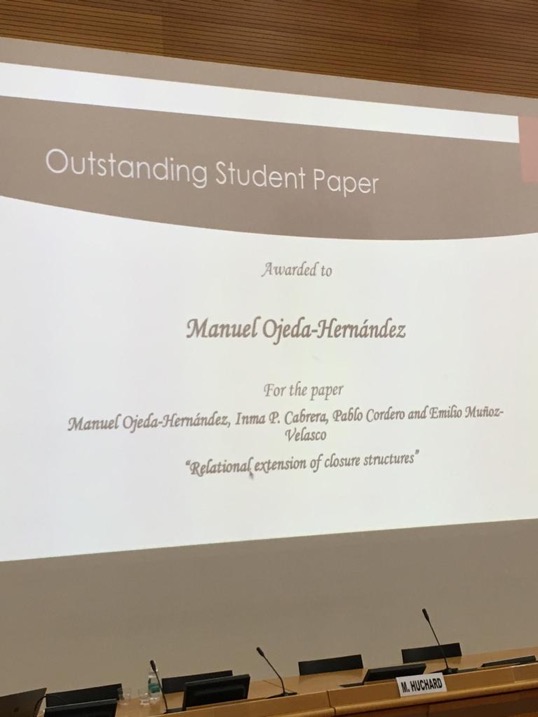
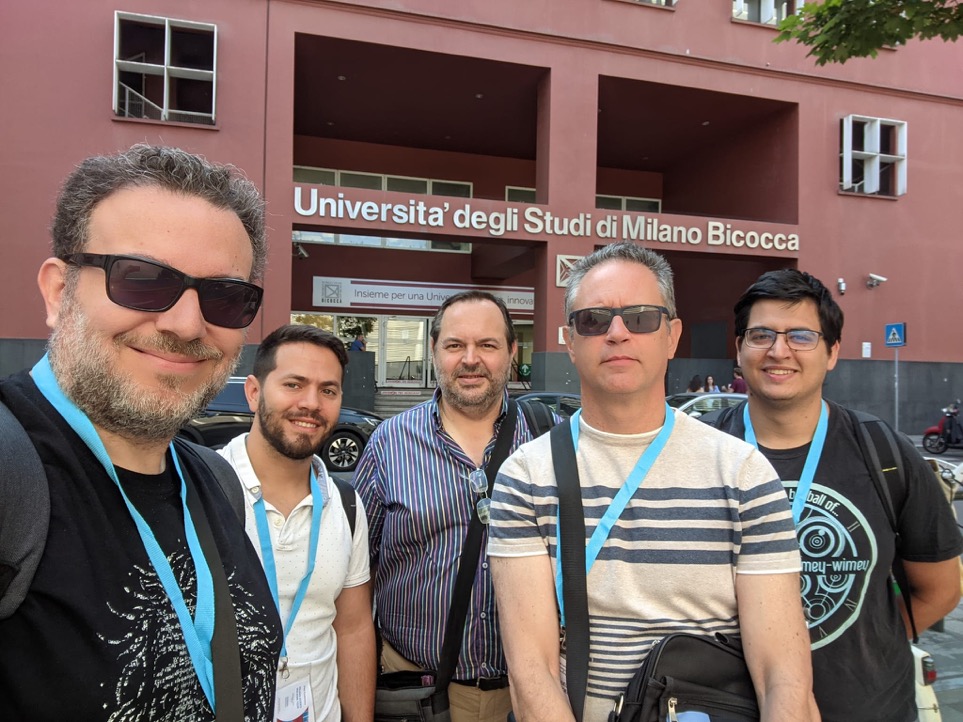
CMMSE 2022
08/07/22/12:34 Filed in: Conference participation
Int Conf on Computational and Mathematical Methods in Science and Engineering, CMMSE, Rota, Cádiz, Spain, July 3-7, 2022
As in previous years, we included in CMMSE a special session entitled Mathematical Methods in Computer Science. The session was well-attended. We presented the work "Mining fuzzy concept lattices" (presentation by Domingo López-Rodríguez), "Fuzzy closure structures as fixed points of a fuzzy Galois connection" (by Emilio Muñoz et al, presented by Manuel Ojeda-Hernández) and "Using f-indexes of inclusion and contradiction for a fuzzy version of the square of oppositions" (presented by Manuel Ojeda-Aciego).
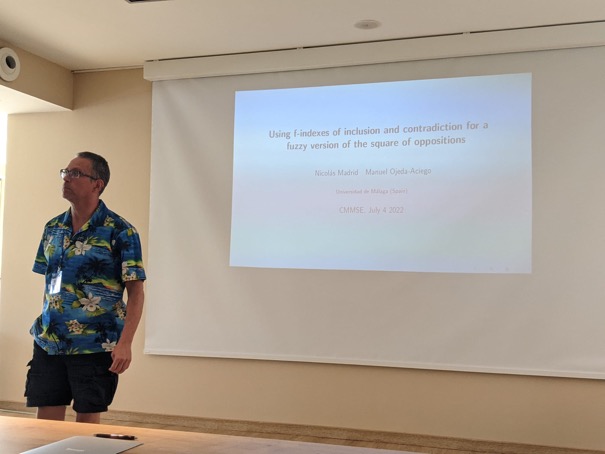
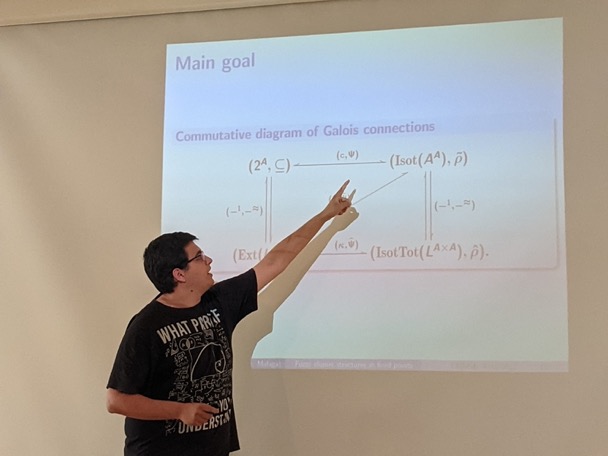
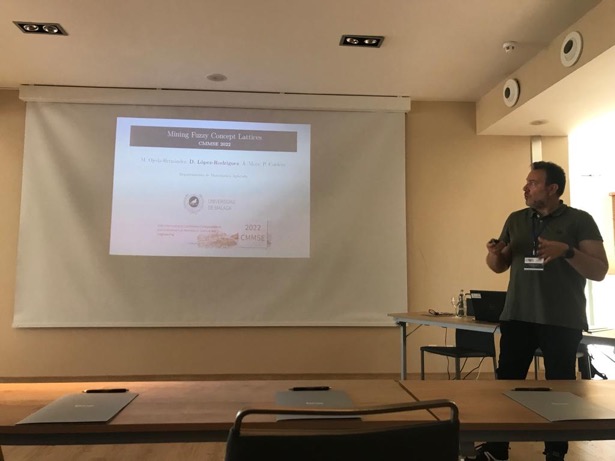
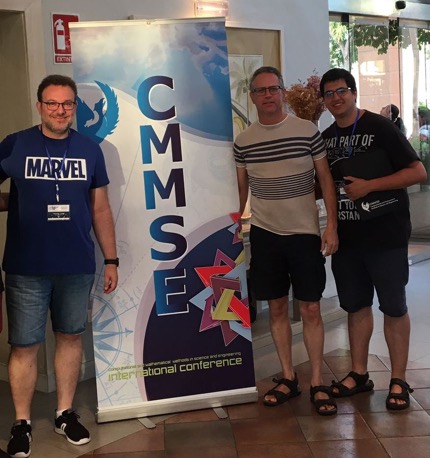
Conference paper accepted
08/07/22/12:27 Filed in: Conference paper
F.J. Valverde-Albacete, C. Peláez-Moreno, I.P. Cabrera, P. Cordero, M. Ojeda-Aciego. Can FCA Provide a Framework for Artificial General Intelligence? Workshop What can FCA do for Artificial Intelligence? (FCA4AI@IJCAI-ECAI'22), Vienna, 2022.
ABSTRACT This paper is an attempt at bridging two strains of research being developed by the authors: a theory of information flows to subserve intelligence and a theory of affordances for the modelling of Embodied, Embedded, Extended and Enacted Computational Intelligence as pro- vided by FCA. We list previous successes, present challenges, and future avenues of research that suggest themselves.
ABSTRACT This paper is an attempt at bridging two strains of research being developed by the authors: a theory of information flows to subserve intelligence and a theory of affordances for the modelling of Embodied, Embedded, Extended and Enacted Computational Intelligence as pro- vided by FCA. We list previous successes, present challenges, and future avenues of research that suggest themselves.
Conference papers accepted
01/07/22/10:17 Filed in: Conference papers
N. Madrid, M. Ojeda-Aciego. Nuevos resultados sobre el f-índice de inclusión. Simp. Nacional sobre Tecnología y Lógica Difusa (ESTYLF), Toledo, 2022.
ABSTRACT En este documento presentamos alguno de los últimos resultados teóricos obtenidos sobre el f-índice de inclusión. Estos resultados motivan el uso de dicho índice como una nueva forma de representar la inclusión entre dos conjuntos difusos y como un operador de inferencia lógica. En este resumen recordamos dos: se satisfacen los axiomas de Sinha-Dougherty (convenientemente adaptados al marco teórico del f-índice de inclusión) y, además, corresponde a una elección optimal de una implicación difusa residuada para llevar a cabo la inferencia Modus Ponens.
I.P. Cabrera, P. Cordero, E. Muñoz-Velasco, Manuel Ojeda-Aciego. Conexiones de Galois relacionales difusas entre digrafos transitivos difusos. Simp. Nacional sobre Tecnología y Lógica Difusa (ESTYLF), Toledo, 2022.
ABSTRACT Presentamos una versión difusa de la noción de conexión de Galois relacional entre grafos dirigidos transitivos difusos (digrafos T-difusos) en el entorno específico en el que el álgebra subyacente de valores de verdad es un álgebra de Heyting completa. Los componentes de dicha conexión de Galois difusa son relaciones difusas que satisfacen ciertas propiedades razonables expresadas en términos de lo que denominamos "full powering". Además, proporcionamos una condición necesaria y suficiente bajo la cual es posible construir un adjunto a la derecha para una relación difusa dada entre un digrafo T-difuso y un conjunto no estructurado.
F. Pérez-Gámez, P. Cordero, M. Enciso, Á. Mora, M. Ojeda-Aciego. Análisis de conceptos formales bajo una visión intuicionista. Simp. Nacional sobre Tecnología y Lógica Difusa (ESTYLF), Toledo, 2022.
ABSTRACT Contextos formales parciales son contextos con tres valores que nos permite establecer cuando una propiedad se satisface o no. Además, permite representar situaciones en las que existe ignorancia sobre si una propiedad se satisface o no. Esto puede ser bastante útil en diferentes aspectos como cuando hay información desconocida o, también, cuando aparece la información desconocida debido a intentamos reducir el tamaño de un contexto formal agrupando filas. En este artículo extendemos estas nociones e ideas para añadir grados de conocimiento.
M. Ojeda-Hernandez, I. P. Cabrera, P. Cordero, E. Muñoz-Velasco. Un estudio preliminar de relaciones de clausura difusas. Simp. Nacional sobre Tecnología y Lógica Difusa (ESTYLF), Toledo, 2022.
ABSTRACT Los operadores de clausura son elementos clave de las matemáticas tanto puras como aplicadas. Esta contribución trata la búsqueda de una definición de relación de clausura difusa que extienda de manera apropiada el concepto de operador de clausura en el marco de los retículos completos difusos. La condición que se busca extender es la correspondencia biyectiva con los sistemas de clausura difusos. Se parte de las definiciones existentes de relación de clausura difusa y se acotan las condiciones necesarias para la existencia de la biyección hasta que se encuentran las condiciones óptimas.
P. Cordero, M. Enciso, D. López-Rodríguez, Á. Mora. Uso de Lógica Difusa para Construir un Sistema Recomendador Médico. Simp. Nacional sobre Tecnología y Lógica Difusa (ESTYLF), Toledo, 2022.
ABSTRACT En este trabajo, se propone un motor automatizado basado en la Lógica de Simplificación difusa para realizar sugerencias a los usuarios.
Los sistemas de recomendación conversacional han demostrado ser un buen enfoque en telemedicina, construyendo un diálogo entre el usuario y el recomendador basado en las preferencias del usuario proporcionadas en cada paso de la conversación. Aquí proponemos un sistema de recomendación conversacional para el diagnóstico médico utilizando la lógica difusa.
ABSTRACT En este documento presentamos alguno de los últimos resultados teóricos obtenidos sobre el f-índice de inclusión. Estos resultados motivan el uso de dicho índice como una nueva forma de representar la inclusión entre dos conjuntos difusos y como un operador de inferencia lógica. En este resumen recordamos dos: se satisfacen los axiomas de Sinha-Dougherty (convenientemente adaptados al marco teórico del f-índice de inclusión) y, además, corresponde a una elección optimal de una implicación difusa residuada para llevar a cabo la inferencia Modus Ponens.
I.P. Cabrera, P. Cordero, E. Muñoz-Velasco, Manuel Ojeda-Aciego. Conexiones de Galois relacionales difusas entre digrafos transitivos difusos. Simp. Nacional sobre Tecnología y Lógica Difusa (ESTYLF), Toledo, 2022.
ABSTRACT Presentamos una versión difusa de la noción de conexión de Galois relacional entre grafos dirigidos transitivos difusos (digrafos T-difusos) en el entorno específico en el que el álgebra subyacente de valores de verdad es un álgebra de Heyting completa. Los componentes de dicha conexión de Galois difusa son relaciones difusas que satisfacen ciertas propiedades razonables expresadas en términos de lo que denominamos "full powering". Además, proporcionamos una condición necesaria y suficiente bajo la cual es posible construir un adjunto a la derecha para una relación difusa dada entre un digrafo T-difuso y un conjunto no estructurado.
F. Pérez-Gámez, P. Cordero, M. Enciso, Á. Mora, M. Ojeda-Aciego. Análisis de conceptos formales bajo una visión intuicionista. Simp. Nacional sobre Tecnología y Lógica Difusa (ESTYLF), Toledo, 2022.
ABSTRACT Contextos formales parciales son contextos con tres valores que nos permite establecer cuando una propiedad se satisface o no. Además, permite representar situaciones en las que existe ignorancia sobre si una propiedad se satisface o no. Esto puede ser bastante útil en diferentes aspectos como cuando hay información desconocida o, también, cuando aparece la información desconocida debido a intentamos reducir el tamaño de un contexto formal agrupando filas. En este artículo extendemos estas nociones e ideas para añadir grados de conocimiento.
M. Ojeda-Hernandez, I. P. Cabrera, P. Cordero, E. Muñoz-Velasco. Un estudio preliminar de relaciones de clausura difusas. Simp. Nacional sobre Tecnología y Lógica Difusa (ESTYLF), Toledo, 2022.
ABSTRACT Los operadores de clausura son elementos clave de las matemáticas tanto puras como aplicadas. Esta contribución trata la búsqueda de una definición de relación de clausura difusa que extienda de manera apropiada el concepto de operador de clausura en el marco de los retículos completos difusos. La condición que se busca extender es la correspondencia biyectiva con los sistemas de clausura difusos. Se parte de las definiciones existentes de relación de clausura difusa y se acotan las condiciones necesarias para la existencia de la biyección hasta que se encuentran las condiciones óptimas.
P. Cordero, M. Enciso, D. López-Rodríguez, Á. Mora. Uso de Lógica Difusa para Construir un Sistema Recomendador Médico. Simp. Nacional sobre Tecnología y Lógica Difusa (ESTYLF), Toledo, 2022.
ABSTRACT En este trabajo, se propone un motor automatizado basado en la Lógica de Simplificación difusa para realizar sugerencias a los usuarios.
Los sistemas de recomendación conversacional han demostrado ser un buen enfoque en telemedicina, construyendo un diálogo entre el usuario y el recomendador basado en las preferencias del usuario proporcionadas en cada paso de la conversación. Aquí proponemos un sistema de recomendación conversacional para el diagnóstico médico utilizando la lógica difusa.
Book chapter accepted
01/07/22/09:17 Filed in: Book chapter
D. López-Rodríguez, E. Muñoz-Velasco, M. Ojeda-Aciego. Formal methods in FCA and Big Data. In Complex Data Analytics with Formal Concept Analysis, (R. Missaoui, L. Kwuida, T. Abdessalem, ed.) Springer. 2022.
ABSTRACT Formal Concept Analysis (FCA) plays an important role in knowledge representation and knowledge discovery, and has generated an increasingly growing research field. The use of FCA in the context of big data provides a basis for better interpretability and explainability of results, usually lacking in other statistical approaches to data analysis; however, scalability is an important issue for FCA logic-based tools and techniques, such as the generation and use of implicational systems. We survey the theoretical and technical foundations of some trends in FCA. Specifically, we present a summary of promising theoretical and practical applications of FCA that could be used to solve the problem of dealing with big data. Furthermore, we propose some directions for future research to solve this problem.
ABSTRACT Formal Concept Analysis (FCA) plays an important role in knowledge representation and knowledge discovery, and has generated an increasingly growing research field. The use of FCA in the context of big data provides a basis for better interpretability and explainability of results, usually lacking in other statistical approaches to data analysis; however, scalability is an important issue for FCA logic-based tools and techniques, such as the generation and use of implicational systems. We survey the theoretical and technical foundations of some trends in FCA. Specifically, we present a summary of promising theoretical and practical applications of FCA that could be used to solve the problem of dealing with big data. Furthermore, we propose some directions for future research to solve this problem.
CLA 2022
24/06/22/12:34 Filed in: Conference participation
Concept Lattices and their Applications, CLA, Tallinn, Estonia, June 20-22, 2022
We presented four works "Fuzzy closure systems over Heyting algebras as fixed points of a fuzzy Galois connection" (by Emilio Muñoz and other colleagues in the department, Manuel Ojeda-Hernández presented the paper), "Revisiting Algorithms for Fuzzy Concept Lattices" (by Domingo López and other colleagues in the department), and "Partial formal contexts with degrees" and "On the affordance-theoretic bases of the landscape of knowledge paradigm" (by Manuel Ojeda-Aciego and others).
Back to the onsite format conference, with interesting invited talks by our colleagues and co-authors Peter Vojtáš and Bernard De Baets.
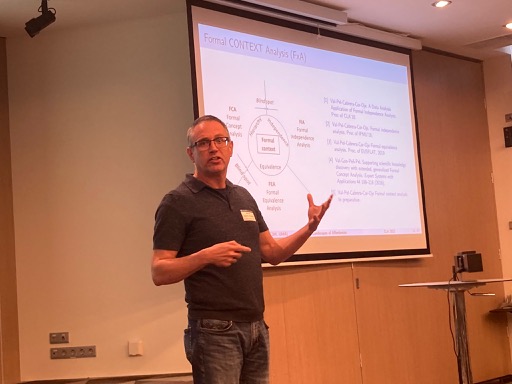
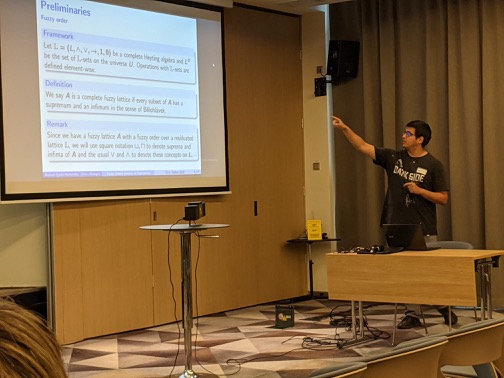
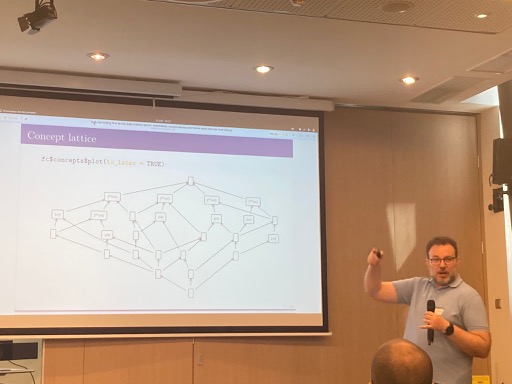
Journal paper accepted
30/05/22/11:27 Filed in: Journal paper
N. Madrid, C. Cornelis. Kitainik axioms do not characterize the class of inclusion measures based on contrapositive fuzzy implications. Information Sciences, 2022. To appear.
ABSTRACT In this short communication, we refute the conjecture by Fodor and Yager that the class of inclusion measures proposed by Kitainik coincides with that of inclusion measures based on contrapositive fuzzy implications. In particular, we show that the conjecture only holds when the considered universe of discourse is finite.
ABSTRACT In this short communication, we refute the conjecture by Fodor and Yager that the class of inclusion measures proposed by Kitainik coincides with that of inclusion measures based on contrapositive fuzzy implications. In particular, we show that the conjecture only holds when the considered universe of discourse is finite.
Journal papers accepted
30/05/22/10:10 Filed in: Journal papers
M. Ojeda-Hernández, I.P. Cabrera, P. Cordero and E. Muñoz-Velasco. Fuzzy Closure Relations. Fuzzy Sets and Systems, 2022. To appear
ABSTRACT The concept of closure operator is key in several branches of mathematics. In this paper, closure operators are extended to relational structures, more specifically to fuzzy relations in the framework of complete fuzzy lattices. The core of the work is the search for a suitable definition of (strong) fuzzy closure relation, that is, a fuzzy relation whose relation with fuzzy closure systems is one-to-one.The study of the properties of fuzzy closure systems and fuzzy relations helps narrow down this exploration until an appropriate definition is settled.
W. Conradie, D. Della Monica, E. Muñoz-Velasco, G. Sciavicco, I.E. Stan. Fuzzy Halpern and Shoham’s Interval Temporal Logics. Fuzzy Sets and Systems, 2022. To appear
ABSTRACT The most representative interval temporal logic, called HS, was introduced by Halpern and Shoham in the nineties. Recently, HS has been proposed as a suitable formalism for modern artificial intelligence applications; however, when dealing with real-life data one is not always able to express temporal re- lations and propositional labels in a definite, crisp way. In this paper, follow- ing the seminal ideas of Fitting and Zadeh, we present a fuzzy generalization of HS, called FHS, that partially solves such problems of expressive power. We study FHS from both a theoretical and an application standpoint: first, we discuss its syntax, semantics, expressive power, and satisfiability problem; then, we define and solve the time series FHS finite model checking problem, to serve as the basis of future applications.
ABSTRACT The concept of closure operator is key in several branches of mathematics. In this paper, closure operators are extended to relational structures, more specifically to fuzzy relations in the framework of complete fuzzy lattices. The core of the work is the search for a suitable definition of (strong) fuzzy closure relation, that is, a fuzzy relation whose relation with fuzzy closure systems is one-to-one.The study of the properties of fuzzy closure systems and fuzzy relations helps narrow down this exploration until an appropriate definition is settled.
W. Conradie, D. Della Monica, E. Muñoz-Velasco, G. Sciavicco, I.E. Stan. Fuzzy Halpern and Shoham’s Interval Temporal Logics. Fuzzy Sets and Systems, 2022. To appear
ABSTRACT The most representative interval temporal logic, called HS, was introduced by Halpern and Shoham in the nineties. Recently, HS has been proposed as a suitable formalism for modern artificial intelligence applications; however, when dealing with real-life data one is not always able to express temporal re- lations and propositional labels in a definite, crisp way. In this paper, follow- ing the seminal ideas of Fitting and Zadeh, we present a fuzzy generalization of HS, called FHS, that partially solves such problems of expressive power. We study FHS from both a theoretical and an application standpoint: first, we discuss its syntax, semantics, expressive power, and satisfiability problem; then, we define and solve the time series FHS finite model checking problem, to serve as the basis of future applications.
